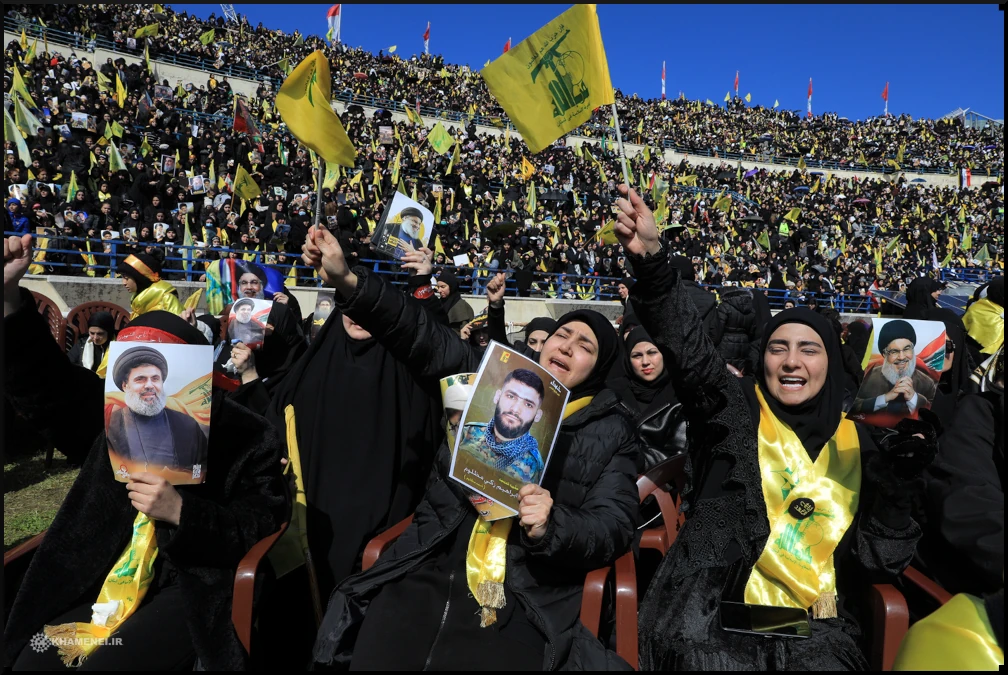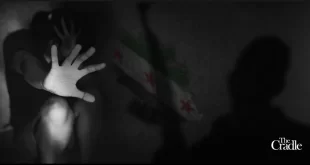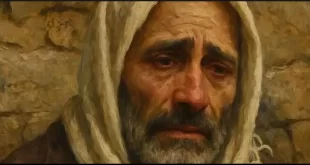by Sabah Haidar, published on Mondoweiss, March 24, 2025
The IMF and World Bank are conditioning reconstruction funds on Lebanon’s normalization with Israel and disarming Hezbollah. In the Dahiya suburb of Beirut, the people who’ve lost their homes in the war think this is unacceptable.
Since February 2025, the United States has intensified its efforts to facilitate normalization between Lebanon and Israel. U.S. Deputy Envoy to the Middle East Morgan Ortagus was reported to have delivered an ultimatum to Lebanese leaders, urging the quick formation of civilian committees for negotiations with Israel. Failure to comply could result in Washington withdrawing from the oversight committee, potentially granting Israel greater operational freedom in South Lebanon.
This initiative builds upon previous U.S.-mediated agreements, including the 2022 maritime border deal and the 2024 ceasefire between Israel and Hezbollah. However, internal opposition within Lebanon remains strong, particularly from Hezbollah and its supporters, who view normalization as a betrayal of resistance values. While some Lebanese factions express openness to dialogue, the path to normalization is fraught with political complexities and regional tensions, underscoring the delicate nature of U.S. diplomatic endeavors in the Middle East.
In March, Steve Witkoff, United States Special Envoy to the Middle East — whose background and expertise is in real estate law and property development, particularly casinos, sparked anger and disbelief among millions when he suggested that Lebanon and Syria might consider normalizing ties with Israel under the Abraham Accords, citing significant regional changes.
The goal of the U.S. and Israel is to completely dismantle and destroy Hezbollah. Their demands for normalization, in all their delusion, clearly aim to create fundamental setbacks for any resistance groups.
Between September 27 and November 27, 2024, Israel launched thousands of airstrikes on South Lebanon, the Beqaa region in the East, and Beirut’s densely populated (predominantly Shia) Dahiya suburb. The violent assault left thousands of buildings, homes, and businesses in ruins, killing several thousand and displacing hundreds of thousands of civilians before the 60-day ceasefire came into effect.
During that violent two-month onslaught, the people of Dahiya, South Lebanon, and the Eastern Beqaa region fled to other parts of the country for safety and shelter, becoming internally displaced overnight. After the ceasefire, they returned to their homes and villages en masse, and thousands found nothing but rubble, destruction, and death.

Israel repeatedly violated the ceasefire in this period, which has been closely documented. In the first 3 weeks of the ceasefire alone, by December 18, 2024, Lebanese authorities had reported approximately 248 breaches, involving airstrikes, drone attacks, and artillery shelling, resulting in casualties and infrastructure damage. By December 29, 2024, the total number of violations had risen to 325, with 33 fatalities and 37 injuries reported. As of December 22, 2024, reports indicated at least 285 violations within the first 25 days of the ceasefire. The numbers have risen exponentially since then.
The scale of destruction in Dahiya, which was previously rebuilt after the 2006 war with Israel, is immense. According to 2022 estimates from the Washington Institute for Near East Policy, Dahiya’s population is close to one million, divided among its five main districts: Ghobeiry, Burj al-Barajneh, Haret Hreik, Hay al-Sellom (and adjacent Laylaki), and the coastal Ouzai that is visible when landing in Beirut – one of the poorest districts of Beirut now – but before the Lebanese Civil War was home to some of Lebanon’s most luxurious beach resorts. According to a UNDP Rapid Assessment report published in January 2025, the district of Haret Hreik experienced 33% of the total destruction from among Dahiye’s districts, followed by Mrejeh, which experienced 20%.

After the heavy losses Hezbollah and Lebanon have experienced during the recent Israeli onslaught, there was considerable discussion and debate in Lebanon and beyond about who would pay for the cost of reconstruction, which has been widely reported as estimated at $6 billion. After the 2006 war with Israel, reconstruction was more straightforward, as funds from Iran and Qatar flowed into Lebanon easily, and Hezbollah was in a strong position. Other countries that contributed to reconstruction at the time included Saudi Arabia, Kuwait, UAE, France and the U.S. Billions of dollars came in, as victims who lost their homes were asked to itemize every piece of furniture to ensure that they were compensated — and they were.
But since 2006, Lebanon has experienced countless calamities, including the Lebanese financial and economic collapse in 2019, the Beirut port blast in 2020, and repeated failures to elect a president and form a government, which was only resolved in January when Army chief Joseph Aoun was elected as president. The reality is that the Lebanese government has no real means to contribute to reconstruction, and Hezbollah after this war, is in a completely different situation to what it was after 2006.
What is now emerging is a multi-pronged reconstruction strategy involving the World Bank, the IMF and international donors. Separately, Hezbollah has started to map out a more direct reconstruction strategy, even if it is not yet fully clear.
In the heavily hit Laylaki district of Dahiya, Lara, 35, a pharmacist, and her parents are considered the lucky ones, as their building was not targeted in the bombings. Every building around theirs was completely flattened.
When they returned to their apartment after the ceasefire, they saw that while the building itself was intact, the pressure of the bombings had blown out their windows and doors, and the glass and debris had destroyed their furniture and personal items. She’s not sure what Hezbollah’s long-term reconstruction plans are for the area, but she is grateful for the interim efforts.
“I know there are some contingency plans going on, and people are trying to find solutions — my parents’ windows were destroyed, and Hezbollah was very quick to restore them and the doors within one week of us returning,” she told Mondoweiss. “They have a list of what needs to be done and their scanning and assessment was done quickly. Some people received money to help them recover — right after the war. It was at least something. Maybe less than the total amount needed, but it was immediate assistance, and at least it shows that they are working on helping the people.” She paused before adding, “In a perfect world the government should pay for it.”

No to normalization, yes to resistance
In February, several media reports emerged that the World Bank and IMF reconstruction funds for Lebanon would be conditional on normalization with Israel and disarming the resistance. According to sources cited by the Lebanese daily Al-Akhbar, IMF and World Bank officials have linked Lebanon’s access to funding to “political steps” to be taken within a specific timeline, as expressed by Kristalina Georgieva, the IMF’s managing director.
This condition has infuriated people in Lebanon, both supporters and non-supporters of Hezbollah, calling the proposition outrageous and an explicit attempt to blackmail Lebanese victims of Israeli aggression.
While the vast majority of Lebanese do not want war, making peace with their enemy is not a possibility for them. The vast majority of support for the resistance comes from the Shia regions of the country, including in neighborhoods like Dahiya, but that support represents a sizeable portion of the country in terms of both geography and population (South Lebanon, Beqaa, and all the Southern Suburbs of Beirut). Various sources state the Shia are estimated to make up between 30 and 40 percent of Lebanon’s population, although precise figures are impossible to obtain — the last census held in the country was in 1932 and hasn’t been redone since due to political sensitivities over the confessional balance of power.

Muhammad H. is a 49-year-old taxi driver in Beirut, from the Ghobeiry district of Dahiya. Married with three kids, their entire apartment block was flattened in the recent bombings, and he lives in temporary accommodation. He juggles jobs to earn a living.
Asked how he feels about the IMF and World Bank calls for normalization, he is adamant: “We don’t socialize or work with Zionists. We don’t accept taking away the power and means of the resistance — and no one in the world can dictate to us or threaten us. We are the generations of the sons of Sayyed Hassan Nasrallah [the former secretary-general of Hezbollah].”
Lina H., 35, is an accountant with a local business in Dahiya and lives with her elderly parents and two brothers. A photo of Nasrallah sits on their shelf above the TV alongside some candles and a prayer from the Quran. Their longtime home was in an apartment building in Haret Hreik where they had lived happily for 30 years. A few Hezbollah members lived in their building and they shared warm neighborly relations, and know they are why the building was targeted.
After the ceasefire started, Lina and her family found themselves in need of a home, and they couldn’t wait for anyone to figure out a solution for them: “We found a home on our own as we were determined to live in the same area where our destroyed house was located.” Asked how she feels about the IMF and World Bank calls for disarming the resistance and normalization, she is quick to say: “What is important to us is not to disarm the resistance, even if our homes are not rebuilt and remain destroyed. There is no normalization or peace with the Zionist enemy.”
This widespread support for the resistance comes as no surprise to anyone in Lebanon or beyond. On February 23, the funeral of Nasrallah and his presumed successor, Sayyed Hashem Safiyyudin, was held in Beirut. It was the largest funeral in Lebanon’s history, with between 1.4 and 1.8 million people in attendance, including hundreds of thousands who flew in from around the world. People of all faiths, political confessions, and nationalities were in attendance, including Mandela, the grandson of the late Nelson Mandela.
Five Israeli fighter jets flew over the throngs twice in an attempted show of intimidation, while the coffins of the deceased were moving past mourners in the stadium where the funeral ceremony was held. The crowd’s reaction, both inside and outside the stadium, was of overwhelming defiance, as they collectively erupted in chants of “Labbayk ya Nasrallah” — expressing commitment to Nasrallah’s philosophy of resistance, followed by chants of “Death to Israel.”
Asked how she feels about demands for normalization in order for Lebanon to get reconstruction funds, Lara, the pharmacist, is adamant as she echoes the views of other victims of the Israeli bombs and doesn’t skip a beat to reply: “It’s outrageous. They [the IMF and World Bank] can keep their money.”
Amid the tensions and talks about reconstruction since then, and despite Israel’s thousands of documented violations of the ceasefire since November 2024 and counting, on March 22 Israel accused Hezbollah of launching rockets at its northern settlements and resumed heavy airstrikes on Lebanon.

Funeral of Hassan Nasrallah and Hashem Safiyyudin, February 23, 2025, Beirut, Lebanon. (Photo: Wikimedia Commons)
Hezbollah immediately issued a statement denying any responsibility for those rockets — even looking into the matter and verifying that the technique those rockets were sent with does not correspond to how Hezbollah rockets are fired — and they’ve never been shy to admit when it has been them.
Hezbollah’s statement denied any involvement in the rocket fire: “Hezbollah categorically denies any involvement in the rocket fire from Southern Lebanon towards the Occupied Palestinian Territories. The party affirms that the ‘Israeli’ enemy’s claims are merely pretexts to justify its ongoing aggression.”
Washington does not want Lebanon to normalize with Israel, because it knows it won’t. What it wants is to turn Lebanon into a besieged and helpless entity that can be used and abused by Israel of its free will. The people will never allow that to happen.
 Syria Support Movement solidarity with the Syrian people
Syria Support Movement solidarity with the Syrian people




